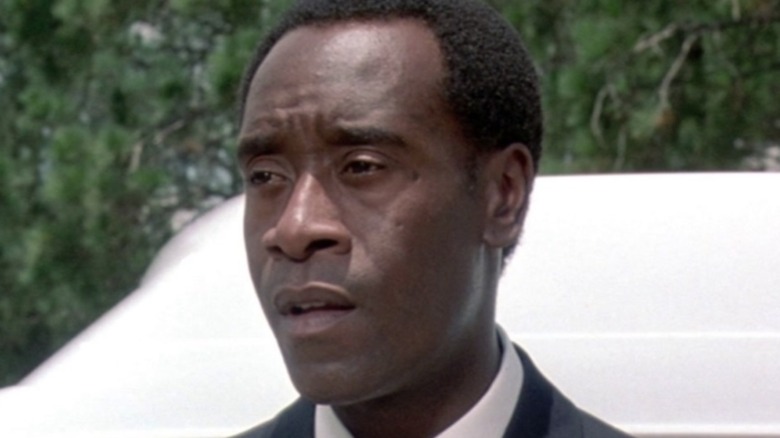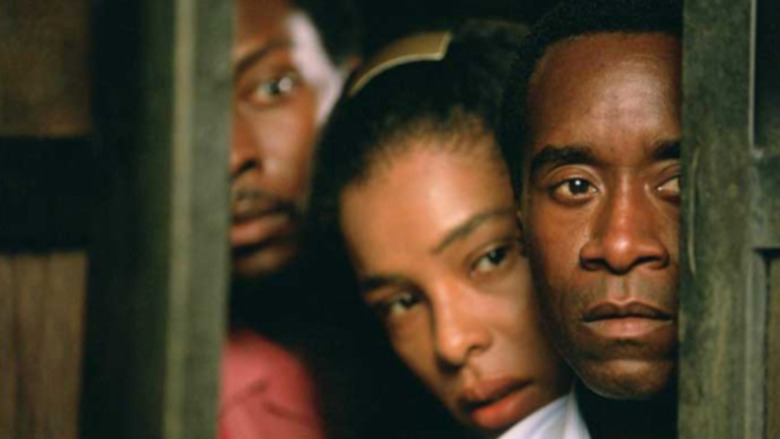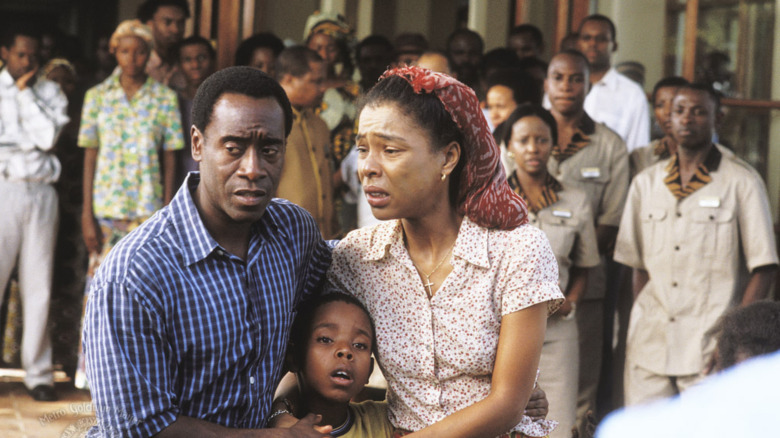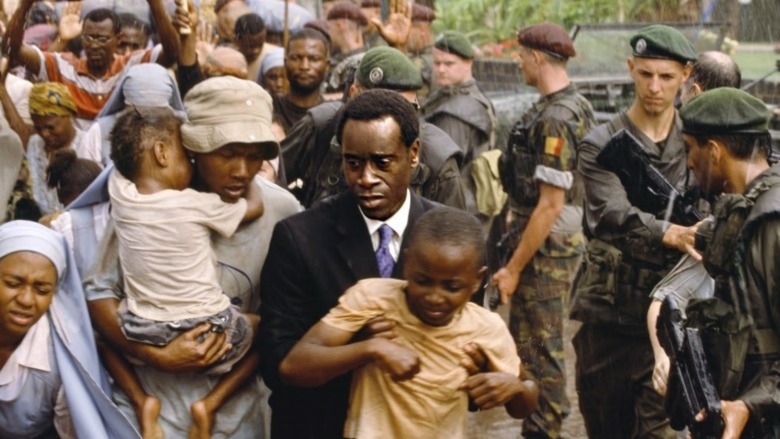The Ending Of Hotel Rwanda Explained
Hotel Rwanda tells a history some would prefer to forget. The film, which is based on the true story, documents how Paul Rusesabagina (Don Cheadle), housed refugees from two warring factions in the Hôtel des Mille Collines during the 1994 Rwandan genocide.
Like many other films that cover political turmoil, Hotel Rwanda is not a perfectly accurate film from a historical perspective. It delves into the fraught tension between two Rwandan ethnic groups — the Hutu, who controlled the government in April 1994, and the Tutsi rebels, which eventually led to a civil war. However, by focusing on the toll that the conflict took on those who were displaced by it, and thanks to Don Cheadle's Academy Award-nominated performance, Hotel Rwanda was acclaimed by critics for its humanistic approach to the story when it was released in 2004.
The film's ending is both gut-wrenching and life-affirming, and shows a glimpse of the full scale of the genocide — though it wasn't, in retrospect, entirely true to life. Let's take a look at how Hotel Rwanda wraps up Paul Rusesabagina's story, what it seems to be saying about the events that unfolded, and how much it actually got right.
In Hotel Rwanda, we see glimpses of genocide through one man's eyes
It is impossible for any film to show the full scale of something like the Rwandan genocide, but by focusing on one man's story, it offers some indication of how horrifying these events were. Hotel Rwanda begins just as tensions between the Hutu and Tutsi are reaching a point of no return. Paul Rusesabagina, who manages the Belgian Hôtel des Mille Collines, knows the strain of this conflict first-hand — while he is Hutu, his wife Tatiana (Sophie Okonedo) is Tutsi, and their marriage causes friction with Hutu extremists, including Paul's goods supplier, Georges Rutaganda (Hakeem Kae-Kazim).
Paul's political connections with Hutu-sympathizing Army generals come in handy after the Hutu president is assassinated and civil war breaks out. He is able to negotiate the safety of his family and neighbors, and they refuge in the hotel. They are eventually joined by more than 1,000 other refugees who have been displaced in the rapidly growing crisis.
For as long as he can, Paul struggles to keep both his family and the refugees safe by attempting to convince Hutu soldiers that they are guests at his hotel. Through his family's stressful experience, we see how tenuous survival was for so many during the genocide.
Paul can only keep the refugees safe for so long in Hotel Rwanda
Hotel Rwanda also offers several glimpses of the horrific toll that the conflict and ensuing genocide took on the region. Tatiana spends much of the film trying to locate her family, including her infant nieces, to no avail. When Paul leaves the hotel to collect supplies from Georges, he witnesses a Hutu-led militia raping Tutsi refugees. On the way back to the hotel, Paul is shocked to see that the road is full of dead bodies. These moments remind both him and the audience how high the stakes are.
While Paul does his best to keep everyone safe, they are betrayed by Gregiore (Tony Kgoroge), a hotel employee. The militia descends, and Paul and the rest of the refugees are forced to evacuate, which they are able to do with the help of a UN convoy led by Colonel Oliver (Nick Nolte).
Paul locks the doors to the Hôtel des Mille Collines for what may be the last time, and boards a UN truck that will take him, his family, and the other refugees to safety. On the road, the truck struggles to make its way amid a throng of refugees, and Paul begins to realize the full scope of the crisis as he stares at the seemingly endless line of people in front of them. While they are briefly terrorized when their convoy is caught in the crossfire between Hutu and Tutsi factions, they cross the frontlines and arrive at a refugee camp in Kabuga, where they are reunited with their baby nieces.
The ending of Hotel Rwanda is powerful, if not entirely accurate
As is explained in the film's end title card, Paul ultimately saved at least 1,200 refugees by housing them at the hotel. The Rusesabagina family moved to Belgium, and the genocide, which ultimately claimed at least one million lives, ended in July 1994. What the title card does not illuminate is that Hotel Rwanda, while based on a true story, did take several creative liberties, according to The Guardian. Among them is the ending itself — by Paul Rusesabagina's own account in his memoir, the refugee camp shown in Hotel Rwanda was far less peaceful and safe than it appears in the film. So, their arrival there was not so much a happy ending as yet another stressful chapter in their journey to safety.
Despite the historical inaccuracies, Hotel Rwanda offers a glimpse of the very real horrors that the victims and survivors of the Rwandan genocide faced. Even though it shows Paul and his family making it to safety, the ending feels more somber than happy, more reflective than victorious.



